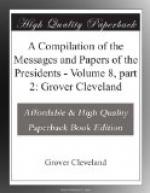Considering the value of the interests we have at stake and considering the smallness of difference between foreign and native tonnage on French vessels alone, it might perhaps be thought advisable to make the sacrifice asked, and especially if it can be so done as to give no title to other the most favored nations to claim it. If the act should put French vessels on the footing of those of natives, and declare it to be in consideration of the favors granted us by the arrets of December 29, 1787, and December 7, 1788 (and perhaps this would satisfy them), no nation could then demand the same favor without offering an equivalent compensation. It might strengthen, too, the tenure by which those arrets are held, which must be precarious so long as they are gratuitous.
It is desirable in many instances to exchange mutual advantages by legislative acts rather than by treaty, because the former, though understood to be in consideration of each other, and therefore greatly respected, yet when they become too inconvenient can be dropped at the will of either party; whereas stipulations by treaty are forever irrevocable but by joint consent, let a change of circumstances render them ever so burdensome.
On the whole, if it be the opinion that the first construction is to be insisted on as ours, in opposition to the second urged by the Court of France, and that no relaxation is to be admitted, an answer shall be given to that Court defending that construction, and explaining in as friendly terms as possible the difficulties opposed to the exemption they claim.
2. If it be the opinion that it is advantageous for us to close with France in her interpretation of a reciprocal and perpetual exemption from tonnage, a repeal of so much of the tonnage law will be the answer.
3. If it be thought better to waive rigorous and nice discussions of right and to make the modification an act of friendship and of compensation for favors received, the passage of such a bill will then be the answer.
TH. JEFFERSON.
[Translation.]
L.G. Otto to the Secretary of State.
PHILADELPHIA, December 13, 1790.
SIR: During the long stay you made in France you had opportunities of being satisfied of the favorable dispositions of His Majesty to render permanent the ties that united the two nations and to give stability to the treaties of alliance and of commerce which form the basis of this union. These treaties were so well maintained by the Congress formed under the ancient Confederation that they thought it their duty to interpose their authority whenever any laws made by individual States appeared to infringe their stipulations, and particularly in 1785, when the States of New Hampshire and of Massachusetts had imposed an extraordinary tonnage on foreign vessels without exempting those of the French nation. The reflections that I have the honor to address to you in the subjoined note being founded on the same principles, I flatter myself that they will merit on the part of the Government of the United States the most serious attention.




